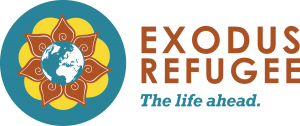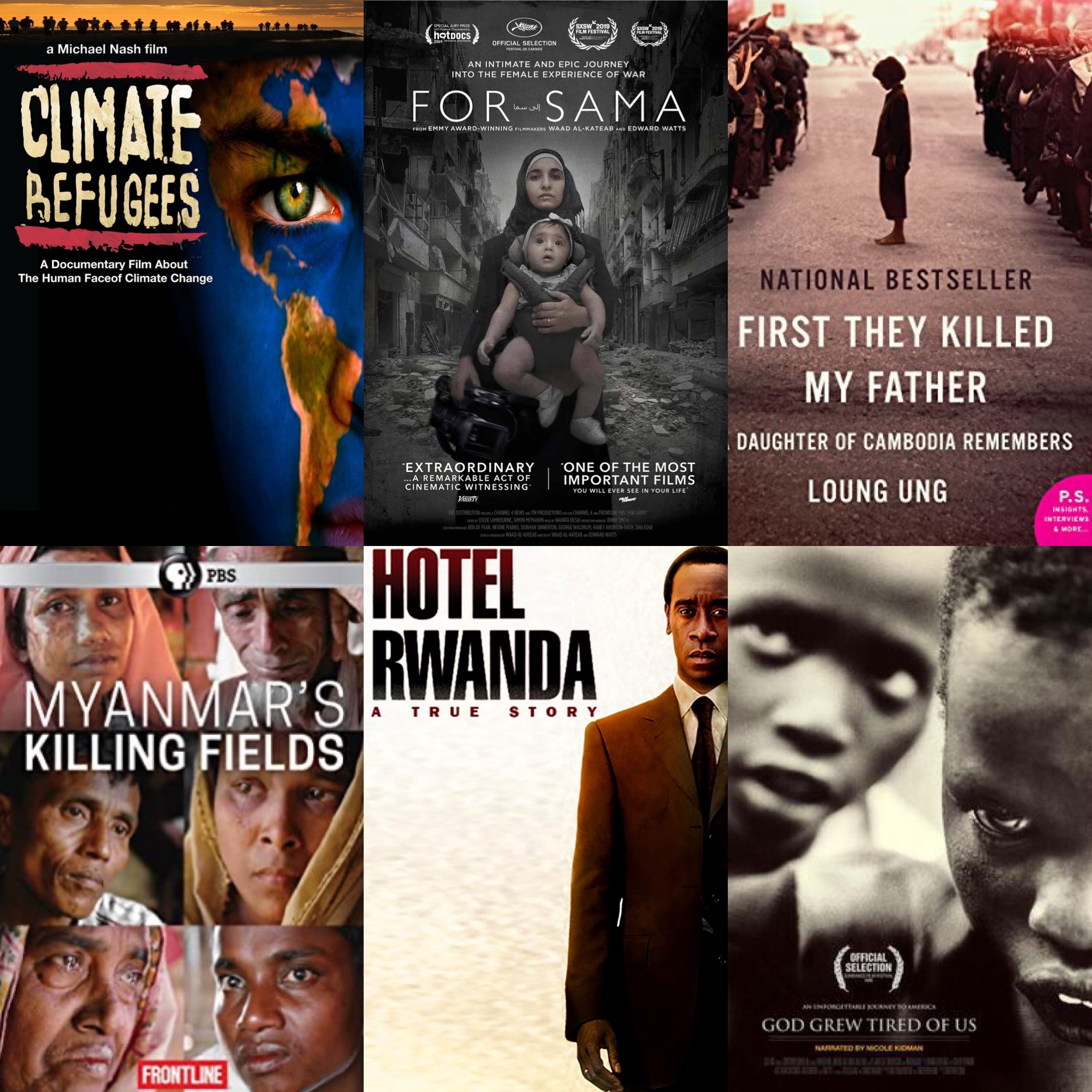Movies and Documentaries
Stay connected with Exodus during this time of social distancing by watching movies or documentaries about refugees and asylees.
Amazon Prime
Two filmmakers witness the Syrian refugee crisis by following two families in transition and aid workers fighting to keep the camp running. With the Syrian conflict entering its sixth year, millions of people continue to be displaced.
Michael P. Nash examines the human plight of climate change with a focus on the intersection of overpopulation and lack of resources.
The plot follows three Tamil refugees, a man, woman, and child, who pose as a husband, wife, and daughter to gain asylum in France. Audiard traces the gradual development of love within the makeshift family, as well as the threats posed by the drug dealers in the housing project they settle in.
An intimate and epic journey into the female experience of war. The story of Waad al-Kateab’s life through five years of the uprising in Aleppo, Syria as she falls in love, gets married and gives birth to Sama, all while conflict rises around her.
During the second Sudanese Civil War, from 1983-2005, two million people died and four million more were displaced. God Grew Tired Of Us chronicles the arduous journey of three young men, John Bul Dau, Daniel Pach and Panther Bior, who walked a thousand miles to escape their war-ridden homeland and ultimately arrived in the United States as refugees in 2001.
More than 65 million people around the world have been forced from their homes to escape famine, climate change and war, the greatest displacement since World War II. Filmmaker Ai Weiwei examines the staggering scale of the refugee crisis and its profoundly personal human impact. Over the course of one year in 23 countries, Weiwei follows a chain of urgent human stories that stretch across the globe, including Afghanistan, France, Greece, Germany and Iraq.
A West African woman leaves behind her five children to relocate to the United States in hopes of providing them with a better future. Despite the trauma of her past and the harsh realities of life in the South Bronx, Aicha Ba perseveres.
American filmmakers Chris Temple and Zach Ingrasci live in a Syrian refugee camp to chronicle the lives and true stories of their displaced neighbors.
HULU
Paul Rusesabagina (Don Cheadle), a Hutu, manages the Hôtel des Mille Collines and lives a happy life with his Tutsi wife (Sophie Okonedo) and their three children. But when Hutu military forces initiate a campaign of ethnic cleansing against the Tutsi minority, Paul is compelled to allow refugees to take shelter in his hotel. As the U.N. pulls out, Paul must struggle alone to protect the Tutsi refugees in the face of the escalating violence later known as the Rwandan genocide.
On a yachting holiday from Darwin to Indonesia, five Australians come across a broken-down fishing boat, full of desperate asylum seekers. The Australians decide to help, towing the refugees, but when they wake the next morning the fishing boat is gone. Five years later they meet some of the refugees again and learn the truth. Someone cut the rope between the two boats and, as a result, seven people died when the fishing boat sank. The revelation drives a wedge of mistrust between the Australians, as they grapple with protecting themselves and doing the right thing. The refugees struggle with their desire for justice and, possibly, revenge. Old secrets come to light, relationships are shattered and lives are put in danger. And one question hangs over it all – who cut the rope
NETFLIX
Since the beginning of civil war in 2011, an estimated nine million Syrians have fled their homes, half of them children. These children flee unimaginable horror to live in hostile conditions.
Loung Ung is 5 years old when the Khmer Rouge assumes power over Cambodia in 1975. They soon begin a four-year reign of terror and genocide in which nearly 2 million Cambodians die. Forced from her family’s home in Phnom Penh, Ung is trained as a child soldier while her six siblings are sent to labor camps.
PBS
The story of four children surviving in war-torn Aleppo, and their escape to a new life in Germany.
A startling portrait of everyday life in a war zone, through the eyes of children.
4.1 Miles follows a Hellenic Coast Guard captain on a small Greek island that is suddenly charged with saving thousands of refugees from drowning at sea during the European migration crisis. The short is an intimate close-up portrait that gives viewers hope for humanity.
Second only to Syria, 2.7 million of the world’s refugees at the end of 2018 were from Afghanistan, the report said. In this FRONTLINE documentary, Afghan journalist Najibullah Quraishi — who has covered the war between the Taliban and the American-led coalition for more than a decade — explored a new front in the country’s violence: the emergence of ISIS. The film offers an up-close perspective on the sort of danger and volatility Afghan refugees are fleeing. “I was thinking maybe the war will never end,” Quraishi said in the documentary, after filming ISIS fighters teaching children how to kill. “Never. And the people will keep suffering from war.”
Another 2.3 million refugees, according to the report, are from South Sudan — where a brutal civil war has sparked a man-made hunger crisis and driven millions of people from their homes. In this immersive, 360-degree documentary from FRONTLINE and the Brown Institute, meet people who were forced to abandon their farmlands and villages to escape the violence — people like Nyakouth, who said she was kidnapped and raped when a pro-government militia attacked her village. “They killed my nephew when he was out taking care of the cattle,” said Nyakouth, who eventually escaped her captors and went on to her country’s largest camp for internally displaced people.
An Afghan family seeks asylum when the Taliban puts a bounty on his head.
At the end of 2018, the report said, 1.1 million of the world’s refugees were from Myanmar, which saw a violent government crackdown on the Rohingya Muslim minority. Drawing on secret footage filmed by a network of citizen activists, this documentary tells the story of an orchestrated campaign against Rohingya Muslims in majority-Buddhist Myanmar going back more than five years — long before their exodus became world news. In the documentary, Rohingyas living in the world’s largest refugee camp in Bangladesh share harrowing stories about why they fled. “My five-year-old was thrown into the river,” said Mumtaz Begum, who survived a massacre at a village called Tula Toli. “I had a two-year-old baby on my hip. They grabbed the baby and threw him in the fire … As they raped me, my daughter was screaming, so they macheted her three times.”
Exodus & Exodus: The Journey Continues
In Exodus, FRONTLINE told the epic, first-hand stories of refugees and migrants fleeing countries including Syria, Afghanistan and The Gambia, who made dangerous journeys across 26 countries in search of safety and a better life. The initial two-hour special relied on camera and smartphone footage filmed by refugees and migrants themselves — from inside a sinking dinghy on a route across the Mediterranean Sea that claimed thousands of lives, to the tents and fires inside Calais’s notorious “Jungle” camp. “Anyone can become a refugee, anyone,” Hassan Akkad, who claims he fled Syria after he was beaten and imprisoned by government forces, said in the film. “It’s not something which you choose. It’s something that happens to you.”
The second documentary chronicles the journeys of refugees and migrants caught in Europe’s tightened borders, who face heightened nationalism and rising anti-immigrant sentiment. “When we were back home, we’d talk about how peaceful and wonderful it would be in Europe, and that we’d live happily ever after,” said a young man named Azizzulah, who fled Afghanistan after his brother — who worked as a translator for the U.S. Army — was killed in a bombing that also killed four American soldiers. “But had I known that the way would be so difficult, I would have never come.”
YouTube
‘The Land Between” offers an intimate insight into the hidden and desperate lives of Sub-Saharan African migrants living in the mountains of northern Morocco. For most, their dream is to enter Europe by jumping a highly-militarised barrier into Melilla, a Spanish enclave on the African continent. With unique and unprecedented access, this film documents the everyday life of these migrants trapped in limbo, as well as the extreme violence and constant mistreatment they face from both the Moroccan and Spanish authorities. It also explores many universal questions, including how and why people are prepared to risk everything, including their life, to leave their country, their family and friends, in search of a new and better life.
OTHER
Camp Domiz is a Syrian refugee camp in northern Iraq. Around 64 thousand predominantly Kurdish-Syrian refugees have sought shelter here. As the number of refugees grew, the camp gradually transformed from a temporary refuge to a makeshift town, where people live and work, go to school, start a business, get married, argue and have fun.
To Breathe Free – Short documentary and winner of “Best Documentary Short” at the Covellite International Film Festival 2017:
“Give me your tired, your poor, your huddled masses yearning to breathe free.”
To Breathe Free follows the 5-year journey of a Syrian family fleeing the war in Homs to the refugee camps in Jordan and starting a new life in Washington, D.C. Using home movies, phone video, family photos and interviews with family members and former refugees, this short documentary gives an intimate and unique perspective not seen in current media reporting on the refugee crisis. To Breathe Free captures the intersection of individual narratives from a family fleeing the Vietnam War in 1970, to the Syrian Conflict in 2017, to the families who help create a new home in our nation’s capital, giving voice to our common humanity and the struggle that binds people together.
Refugees and immigrants are the lifeblood of this country and we must create a support system where they feel safe and welcome here, if we want to have a chance in influencing the rest of the world.
When Teklit Guzay turned 15 he faced a horrifying choice: join the Eritrean army or risk being shot while fleeing his country. He fled. His destination? A fabled land he had heard of but not seen: America.


